Homeless still fighting for funds after bushfire disaster
The residents of Malua Bay, crammed onto the beach with apocalyptic flames chasing them to the water, became symbols of the black summer. But their nightmare continues almost six months on with a tight-fisted and painfully bureaucratic recovery effort leaving them “begging for money”.
Bushfire Support
Don't miss out on the headlines from Bushfire Support. Followed categories will be added to My News.
The residents of Malua Bay, crammed onto the beach with apocalyptic flames chasing them to the water, became symbols of the black summer. But they say their nightmare continues almost six months on with a tight-fisted and painfully bureaucratic recovery effort leaving them “begging for money” donated months ago by generous Australians.
In a dark unit filled with dusty furniture and scattered documents, former police employee Pam Johnson apologises for the mess.
She was one of many whose suburban homes were incinerated on New Year’s morning by the firestorm.
“I went numb and stayed numb for a few weeks,” she said.
“I haven’t slept since.”
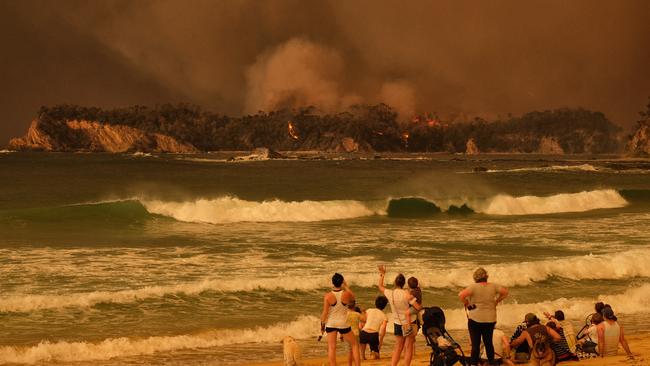
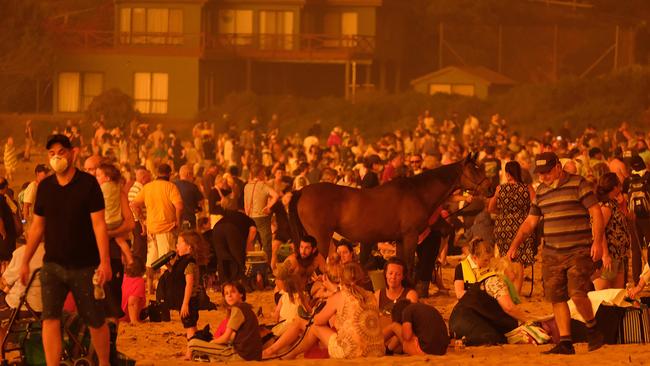
Ms Johnson spent two days in the evacuation centre registering with charity and government representatives before being offered a place in a motel a few kilometres from the smouldering wreckage of her home.
She said she was passed through about 12 pairs of hands and left without any paperwork.
“You walk out so confused with all these people, you can’t remember who was who and you think what the devil was that about?” she said.
The Red Cross said 4500 people passed through the largest recovery centre on the south coast from January 15 to March 28.
They provided psychological help and walked people through the grant process.
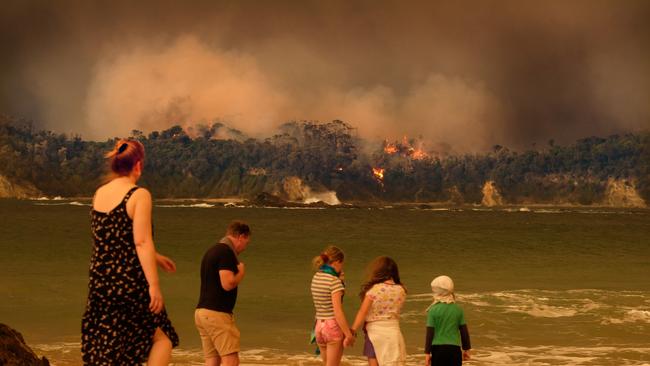
At the motel another guest told her she should talk to a Red Cross worker about recovery grants, she still wasn’t sure what she was entitled to and had no computer to fill out new applications or check old ones.
Weeks ticked by and, with tourists poised to return to the holiday town, she was told she needed a new place to stay and began couch surfing.
Money trickled in, $5000 then $10,000 from the Red Cross, a grand from the Salvos she thinks, but it was taking weeks and no one was calling back when there were errors with her forms or more information was needed.
Bills were still coming in.
She wasn’t alone, Chris Darman and partner Michelle are still living in a caravan on their burned up site and showering in a surf club toilet block.
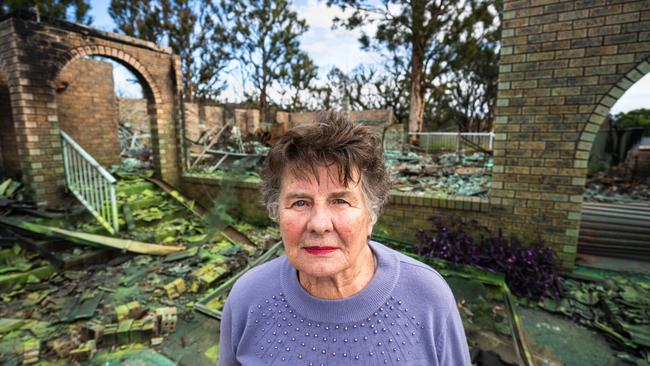
They said accessing the charity grants has been like “pulling teeth” and, after losing everything without insurance, call the three-year plans to distribute the money “despicable”.
The Darmans were given $40,000 but say it took them weeks and weeks, in the end they raided their super to buy the caravan from South Australia.
The priest they bought it from gave him $5000 from the church.
“Why would it take so long to hand out this money?” he said, enraged.
“Three years? We’ve got adversity for the next five.”
“We’ve lost everything, people donated to help us, $40,000 sounds like a lot but it’s peanuts when it’s all gone.”
Another resident – who asked to remain anonymous – said she was calling Red Cross every other week and being told her forms were unreadable or her application was rejected.
“You had the humiliation of losing everything and, after being through the devastation and everything, you had to beg,” she said.
“All we heard was millions and billions being donated and we are standing there saying how do we get this?”
The woman said she’s educated, capable of paperwork, and it took her until mid-March to be “drip fed” $20,000 in increments.
\
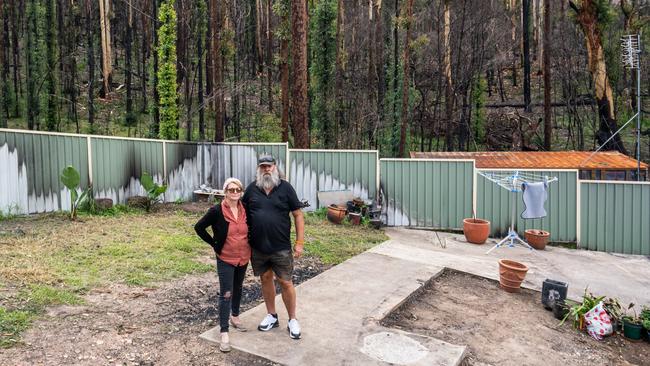
The charity, asked about the delays being reported, said it has been paying out grants since mid-January and have continued to expand.
“The only reasons for delay once people have applied is when we are unable to verify the information provided or unable to verify that a property has been destroyed, in which case Red Cross will always contact the applicant to support them to source the required information,” the spokesperson said.
The charity also contacts councils and other agencies to assemble the information on applicants.
But Ms Johnson had a different experience – she was calling the charity’s hotline and sitting on hold or being cut off, or directed to the website.
Aged in her mid-70s, Ms Johnson doesn’t have a computer, struggles with her smart phone and all her documents had burned up.
She was facing homelessness, her home was still just debris, and she would soon be sleeping in her car.
Thankfully her insurer had paid out quickly and, after fighting with her super fund, she could get the unit.
“I needed that roof over my head,” she said.
“I thought I’m escaping.”
More money dropped into her account last week – more than five months after she lost her home.
She said if she’d been relying on any other grants she’d be finished.
A source close to the Red Cross’ disaster recovery told The Daily Telegraph people like Ms Johnson had fallen through the cracks as the over-bureaucratised organisation.
“It’s change resistant,” the source said.
“They have $130m in the bank, but they have these rigid parameters and it’s stopping the money from getting to people on the ground.”
“There will be more Pams, or people in worse positions.”
The Red Cross said it’s got new bushfire recovery teams rolling out to work in affected areas for the next three years.
One worker is in the Eurobadella shire of which Malua Bay is a part.
Member for Bega and Malua Bay local Andrew Constance said the charities are “beyond desperate and out of touch”.
“I think it’s important Australians know how grateful the locals are but this is outrageous and (the charities) are behaving bureaucratically,” he said.
“There’s an ethos about compassion and immediacy which has to be delivered. People are in crisis.”
He is calling for a national disaster relief fund to co-ordinate the massive funds donated by Australians.
He also called on the charity chiefs to intervene and force the funds to be released quicker – he said the state government was handling the long-term rebuilding of community infrastructure.
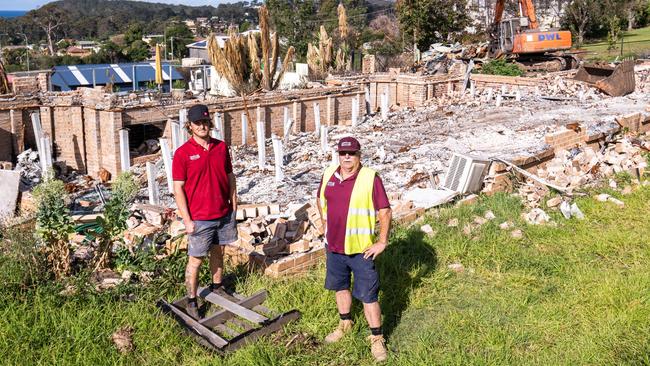
“You can see what’s going to happen – people will forget in two years,” he said.
“People will walk away. They’re traumatised and this is adding trauma.”
On a hillside overlooking Malua Bay father and son Andrew and Matthew Findlay are just starting to pick through the ruins as the government’s contractor, Laing O’Rourke, starts to clear their block.
They, too, said they only heard about recovery grants while chatting with other locals and there was no follow up from any charities, they did all the leg work.
“It’s been too slow, there’s been too many steps and it’s mismanaged,” Matthew said of the recovery’s timeline.
“Australia’s been too ‘she’ll be right’ for too long, I think.”
His father chokes up explaining how hard it is to battle for six months, knowing there’s billions trickling out over a period of years.
“I think the COVID took the pressure off everyone,” he said.
“If we got to organise it it would already be done.”
Up the road Pam’s house is still a pile of crumbled bricks and glass but she says she won’t be beaten by it.
“I’m a fatalist,” she says.
“This was meant to be. I’ll be okay.”
After her interview with The Daily Telegraph Ms Johnson said she was called by the Red Cross and told another $10,000 grant had been approved.
The Red Cross’ Eurobadella worker can be contacted at mkincade@redcross.org.au and they encourage anyone bushfire affected to come forward.
—
